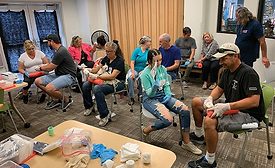Security Education & Training
Education & Training
Trends in 2020: Converged “Digital” Risk Elevates the Security Executive
February 17, 2020
Can Civilians Stop the Bleed?
The work to empower civilians to act as immediate first responders continues.
February 7, 2020
Sign-up to receive top management & result-driven techniques in the industry.
Join over 20,000+ industry leaders who receive our premium content.
SIGN UP TODAY!Copyright ©2024. All Rights Reserved BNP Media.
Design, CMS, Hosting & Web Development :: ePublishing















